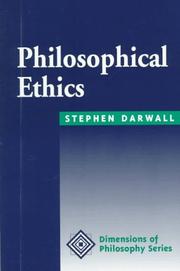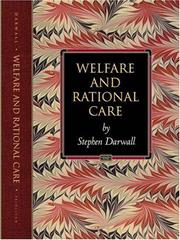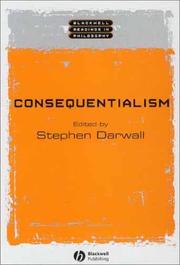| Listing 1 - 10 of 12 | << page >> |
Sort by
|

ISBN: 0631231129 0631231110 Year: 2003 Volume: 9 Publisher: Malden Oxford Berlin Blackwell
Abstract | Keywords | Export | Availability | Bookmark
 Loading...
Loading...Choose an application
- Reference Manager
- EndNote
- RefWorks (Direct export to RefWorks)
Compatibilism --- Determinism and free will --- Determinism and indeterminism --- Determinisme en indeterminisme --- Devoir --- Duty --- Déterminisme et indéterminisme --- Ethics --- Ethiek --- Ethique --- Free agency --- Free will and determinism --- Freedom and determinism --- Freedom of the will --- Indeterminism --- Indeterminisme --- Liberty of the will --- Libre arbitre et déterminisme --- Obligation --- Obligation morale --- Plicht --- Verplichting --- Vrije wil --- Vrije wil en determinisme --- Vrijheid van de wil --- Wilsvrijheid --- #GBIB:CBMER --- Duty. --- Ethics. --- Free will and determinism. --- Deontology --- Ethics, Primitive --- Ethology --- Moral philosophy --- Morality --- Morals --- Philosophy, Moral --- Science, Moral --- Determinism (Philosophy) --- Philosophy --- Values --- Responsibility --- Supererogation

ISBN: 0521451671 0521457823 0511608950 Year: 1995 Publisher: Cambridge : Cambridge University Press,
Abstract | Keywords | Export | Availability | Bookmark
 Loading...
Loading...Choose an application
- Reference Manager
- EndNote
- RefWorks (Direct export to RefWorks)
This book is a major work in the history of ethics, and provides the first study of early modern British philosophy in several decades. Professor Darwall discerns two distinct traditions feeding into the moral philosophy of the seventeenth and eighteenth centuries. On the one hand, there is the empirical, naturalist tradition, comprising Hobbes, Locke, Cumberland, Hutcheson, and Hume, which argues that obligation is the practical force that empirical discoveries acquire in the process of deliberation. On the other hand, there is a group including Cudworth, Shaftesbury, Butler, and in some moments Locke, which views obligation as inconceivable without autonomy and which seeks to develop a theory of the will as self-determining.
Philosophy, British --- Ethics, Modern --- Ethics --- Philosophie britannique --- Morale moderne --- Morale --- History --- Histoire --- #GBIB:Overlegcentrum Christelijke Ethiek --- 17 <09> --- Geschiedenis van de moraal --- 17 <09> Geschiedenis van de moraal --- General ethics --- anno 1600-1699 --- anno 1700-1799 --- Great Britain --- Philosophy [British ] --- 18th century --- Ethics [Modern ] --- 17th century --- History of philosophy --- Shaftesbury, of, Anthony A.C. --- Butler, Joseph --- Hobbes, Thomas --- Masham, Damaris Cudworth --- Culverwell, Nathaniel --- Hutcheson, Francis --- Hume, David --- Locke, John --- Arts and Humanities --- Philosophy

ISBN: 0813378605 9780813378602 Year: 1998 Publisher: Boulder (Colo.): Westview press,
Abstract | Keywords | Export | Availability | Bookmark
 Loading...
Loading...Choose an application
- Reference Manager
- EndNote
- RefWorks (Direct export to RefWorks)
Book
ISBN: 0801415608 9780801493485 080149348X Year: 1983 Publisher: Ithaca (N.Y.): Cornell university press
Abstract | Keywords | Export | Availability | Bookmark
 Loading...
Loading...Choose an application
- Reference Manager
- EndNote
- RefWorks (Direct export to RefWorks)
Reason --- Ethics --- Fairness --- Impartiality --- Conduct of life --- Justice --- Deontology --- Ethics, Primitive --- Ethology --- Moral philosophy --- Morality --- Morals --- Philosophy, Moral --- Science, Moral --- Philosophy --- Values --- Mind --- Intellect --- Rationalism --- Reason.
Book
ISBN: 1282665677 9786612665677 1400825326 9781400825325 Year: 2002 Publisher: Princeton, N.J. : Princeton University Press,
Abstract | Keywords | Export | Availability | Bookmark
 Loading...
Loading...Choose an application
- Reference Manager
- EndNote
- RefWorks (Direct export to RefWorks)
What kind of life best ensures human welfare? Since the ancient Greeks, this question has been as central to ethical philosophy as to ordinary reflection. But what exactly is welfare? This question has suffered from relative neglect. And, as Stephen Darwall shows, it has done so at a price. Presenting a provocative new "rational care theory of welfare," Darwall proves that a proper understanding of welfare fundamentally changes how we think about what is best for people. Most philosophers have assumed that a person's welfare is what is good from her point of view, namely, what she has a distinctive reason to pursue. In the now standard terminology, welfare is assumed to have an "agent-relative normativity." Darwall by contrast argues that someone's good is what one should want for that person insofar as one cares for her. Welfare, in other words, is normative, but not peculiarly for the person whose welfare is at stake. In addition, Darwall makes the radical proposal that something's contributing to someone's welfare is the same thing as its being something one ought to want for her own sake, insofar as one cares. Darwall defends this theory with clarity, precision, and elegance, and with a subtle understanding of the place of sympathetic concern in the rich psychology of sympathy and empathy. His forceful arguments will change how we understand a concept central to ethics and our understanding of human bonds and human choices.
Contentment. --- Ethics. --- Gladness --- Satisfaction --- Happiness --- Peace of mind --- Deontology --- Ethics, Primitive --- Ethology --- Moral philosophy --- Morality --- Morals --- Philosophy, Moral --- Science, Moral --- Philosophy --- Values
Book
ISBN: 9780199662586 0199662584 Year: 2013 Publisher: Oxford: Oxford university press,
Abstract | Keywords | Export | Availability | Bookmark
 Loading...
Loading...Choose an application
- Reference Manager
- EndNote
- RefWorks (Direct export to RefWorks)
Stephen Darwall presents a series of essays that explore and extend the Second-Person Standpoints argument that central moral concepts are irreducibly second personal, entailing mutual accountability and the authority to address demands to one another (and ourselves). He illustrates the second-personal frameworks power to illuminate a wide variety of issues in moral, political, and legal philosophy. Section I concerns morality: its distinctiveness among normative concepts, the metaethics of bipolar obligations (owed to someone); the relation between moral obligations form and the substance of our obligations; whether the fact that an action is wrong is itself a reason against action (as opposed to simply entailing that sufficient moral reasons independently exist); and whether morality requires general principles or might be irreducibly particularistic. Section II consists of two essays on autonomy: one discussing the relation between Kants autonomy of the will and the right to autonomy, and another arguing that what makes an agents desires and will reason-giving is not the basis of internal practical reasons in desire, but the dignity of persons and shared second-personal authority. Section III focuses on the nature of authority and the law. Two essays take up Joseph Razs influential normal justification thesis and argue that it fails to capture authoritys second-personal nature, without which authority cannot create exclusionaryand preemptivereasons.The final two essays concern law.The first sketches the insights that a second-personal approach can provide into the nature of law and the grounds of distinctions between different parts of law.The second shows how a second-personal framework can be used to develop the civil recourse theory in the law of torts.
Ethics --- Interpersonal relations --- Authority --- Responsibility --- Respect for persons --- Liability (Law)

ISBN: 0691092524 Year: 2002 Publisher: Princeton, N.J. : Princeton University Press,
Abstract | Keywords | Export | Availability | Bookmark
 Loading...
Loading...Choose an application
- Reference Manager
- EndNote
- RefWorks (Direct export to RefWorks)
What kind of life best ensures human welfare? Since the ancient Greeks, this question has been as central to ethical philosophy as to ordinary reflection. But what exactly is welfare? This question has suffered from relative neglect. And, as Stephen Darwall shows, it has done so at a price. Presenting a provocative new "rational care theory of welfare," Darwall shows that a proper understanding of welfare fundamentally changes how we think about what is best for people. Most philosophers have assumed that a person's welfare is what is good from her point of view, namely, what she has a distinctive reason to pursue. In the now standard terminology, welfare is assumed to have an "agent-relative normativity." Darwall by contrast argues that someone's good is what one should want for that person insofar as one cares for her. Welfare, in other words, is normative, but not peculiarly for the person whose welfare is at stake. In addition, Darwall makes the radical proposal that something's contributing to someone's welfare is the same thing as its being something one ought to want for her own sake, insofar as one cares. Darwall defends this theory with clarity, precision, and elegance, and with a subtle understanding of the place of sympathetic concern in the rich psychology of sympathy and empathy. His forceful arguments will change how we understand a concept central to ethics and our understanding of human bonds and human choices.
Contentment. --- Ethics.

ISBN: 9780631231080 9780631231073 Year: 2007 Publisher: Malden, Mass. Blackwell
Abstract | Keywords | Export | Availability | Bookmark
 Loading...
Loading...Choose an application
- Reference Manager
- EndNote
- RefWorks (Direct export to RefWorks)

ISBN: 9780631231127 9780631231110 Year: 2007 Publisher: Malden, Mass. Blackwel
Abstract | Keywords | Export | Availability | Bookmark
 Loading...
Loading...Choose an application
- Reference Manager
- EndNote
- RefWorks (Direct export to RefWorks)
Book
ISBN: 0191639591 9780191639593 9780191748417 0191748412 9780199662609 0199662606 9780199662616 Year: 2013 Publisher: Oxford
Abstract | Keywords | Export | Availability | Bookmark
 Loading...
Loading...Choose an application
- Reference Manager
- EndNote
- RefWorks (Direct export to RefWorks)
| Listing 1 - 10 of 12 | << page >> |
Sort by
|

 Search
Search Feedback
Feedback About
About Help
Help News
News